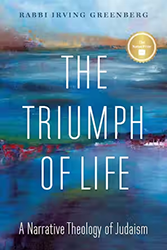Irving Greenberg — rabbi, scholar, and the leading Modern Orthodox proponent of pluralism and interdenominational dialogue within Judaism — has written an extraordinary book. It contains two new essays, seven essays published over the past four decades, responses by leading Jewish and Christian commentators, and a study guide organized by chapters. Greenberg’s essays reflect his personal and theological evolution over these 40 years, as he grapples with the implications of believing in God’s multiple revelations to different peoples as part of the overall purpose of a partnership with humanity. The Noahide laws (given following the Flood described in Genesis) represent God’s “master paradigm” for the relationship between the Divine and human beings, to which all of humanity has been forever committed. This covenantal partnership can never be repealed and/or superseded by other covenants. The particularities of our specific revelations reflect a Divine purposefulness; a schema in which decentralized pluralism represents the optimal model to best serve God’s vision for humanity. God’s revelation to the Jewish people, the revelation to Jesus and through him [the people who became] Christians reflects “…that Judaism and Christianity were jointly and severally intended to play a part in an Infinite Creator’s plan to perfect the world.” Greenberg is by no means dismissive of 20 centuries of Christian anti-Semitism, its role in the Holocaust, and its impact on current and future Jewish-Christian relations. Yet, he proposes that Jews and Christians, along with other faiths that share core principles about the value and dignity of life embodied in the Noahide laws, share an intertwined destiny and life-purpose—tikkun olam—perfecting the world. The caveat: All participating faiths must also realize that each of our truth/faith systems, while Divinely revealed and absolute for its intended peoples, is insufficient by itself to fulfill God’s dreams. Only by entering into partnerships with other willing faiths, while fulfilling our own specific faith’s mandates, can humanity jointly achieve tikkun olam.
There isn’t adequate space here to capture all of the critical nuances of Greenberg’s thesis and propositions, which reflect his broad scholarship and dynamic intellect. As a writer, he presents complex theological concepts in a style and language that at times is as lyrical and soaring as the notions he espouses. Whether one agrees with all of Greenberg’s premises— and they are unlikely to find broad acceptance within the more traditional camps of Judaism — they cannot be simply dismissed. The open-minded reader may find him/herself forever changed as a result of this reading experience and theological journey. For me, this is simply the most stimulating, thought-provoking, and theologically challenging book I have read.





